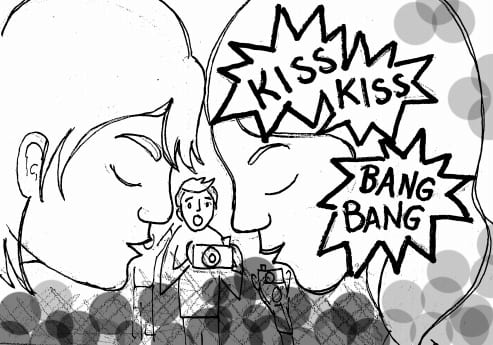
This past week at a stop on the “Bangerz Tour,” two women, Miley Cyrus and Katy Perry, shared a kiss. It may seem minimal in the scheme of current events, but the kiss became a scandal across the Internet as various sources wondered if the celebrities could possibly be, gasp, lesbians! Yet others cried out against these waves of speculation and against Perry and Cyrus for using pseudo-lesbianism as a publicity stunt and spitting in the face of the LGBT rights movement.
I cannot comment on whether the celebrities are lesbians or pseudo-lesbians, for both sides of the issue could stand to remember that sometimes, a kiss is just a kiss. But I’d like to discuss the criticism that the two celebrities are using lesbianism as a publicity stunt. It seems quite likely. If there is one thing that Perry and Cyrus have been good at throughout their respective careers, it is finding cultural boundaries to what is acceptable and jumping across them to cause scandals for the sake of attention.
But here is where I find a problem: For these two to have caused a scandal by acting as pseudo-lesbians would mean that they crossed a cultural boundary that dictates that lesbianism, or even same-sex expressions of affection, are not fully acceptable and are matters of controversy. If the Internet is shocked by two arguably grown women kissing each other, it shows that our society as a whole still treats lesbianism as something foreign and unacceptable.
When we support celebrities such as Ellen Page for coming out, as we should, we celebrate them for crossing a cultural boundary dictating that lesbianism is abnormal. At the same time, we are unconsciously acknowledging and assisting the continuance of this unjust cultural boundary. Let me explain: Would Jennifer Lawrence cause a media uproar if she admitted that she was attracted to men? I think not. We did cause an uproar for Ms. Page, however, and by treating a declaration of lesbianism as a spectacle, we let the media know that we still consider lesbianism to be something abnormal and uncommon. Even in celebrating her bravery, we reinforce the power of a cultural boundary against lesbianism that she had to cross and is now considered different for crossing.
Why does our society pay such heed to a boundary that is being enforced by what is rapidly becoming a minority? I don’t believe that we can be a fully LGBT-friendly society until we cease to acknowledge the existence of this archaic boundary, until we treat lesbianism as something wholly normal and until our society as a whole can see two grown women kissing and not freak out.
In response to the Perry and Cyrus issue, my advice is to ignore it, or at least to avoid making a big deal out of it. If they meant it as a genuine romantic expression, great. If it was a publicity stunt, then treating it as if it was something normal will let them know that pseudo-lesbianism is ineffective since lesbianism is no longer a cultural boundary that our society acknowledges. If a celebrity comes out, congratulate them for their courage but leave it at that. Ignore the cultural boundary that they are crossing; let this unjustly imposed boundary die from a lack of acknowledgement. Try to create a society where people can express love however they choose without having to make a declaration of their sexual orientation. Force our culture to acknowledge homosexual relationships as the normal relationships they truly are, not as the subject of spectacle.
This may not strike at the heart of the problem for our American culture’s unjust treatment of lesbianism, but it is something that everyone can practice in order to create a society in which expressions of lesbianism are normal, not the subjects of spectacle or scandal. Don’t get me wrong, I am not advocating for any kind of quietism. I certainly believe that we should continue campaigning for LGBT rights and fight against injustices. Rather, my proposition involves our behavior in our daily public spheres. I believe that we each must work to alter our individual perceptions of lesbianism in order to force our culture to treat lesbian relationships like the normal, perfectly acceptable and wonderful relationships that they are. We should not apathetically allowing ourselves to support a society that treats open lesbianism as a spectacle.
Bergen Nelson ’15 nelsonb@stolaf.edu is from Buffalo, Minn. He majors in English and philosophy
Graphic Credit: ALLI LIVINGSTON/MANITOU MESSENGER

